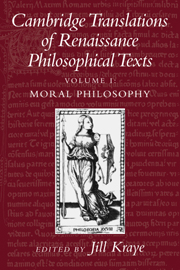Book contents
- Frontmatter
- Contents
- List of Translators
- Preface
- PART I CONCEPTS OF MAN
- PART II ARISTOTELIAN ETHICS AND THE SUPREME GOOD
- PART III ARISTOTELIAN ETHICS AND CHRISTIANITY
- PART IV PLATONIC ETHICS
- PART V STOIC ETHICS
- PART VI EPICUREAN ETHICS
- 20 Petrarch
- 21 Francesco Filelfo
- 22 Cosma Raimondi
- 23 Francisco de Quevedo
- Bibliography of Renaissance Moral Philosophy Texts Available in English
- Index Nominum
- Index Rerum
23 - Francisco de Quevedo
Published online by Cambridge University Press: 05 June 2012
- Frontmatter
- Contents
- List of Translators
- Preface
- PART I CONCEPTS OF MAN
- PART II ARISTOTELIAN ETHICS AND THE SUPREME GOOD
- PART III ARISTOTELIAN ETHICS AND CHRISTIANITY
- PART IV PLATONIC ETHICS
- PART V STOIC ETHICS
- PART VI EPICUREAN ETHICS
- 20 Petrarch
- 21 Francesco Filelfo
- 22 Cosma Raimondi
- 23 Francisco de Quevedo
- Bibliography of Renaissance Moral Philosophy Texts Available in English
- Index Nominum
- Index Rerum
Summary
Introduction
The Defence of Epicurus against Commonly Held Opinions was originally intended as an introduction to Quevedo's Stoic Doctrine (see Chapter 19). The earliest draft of the treatise consisted of little more than a string of quotations about Epicurus and Epicureanism taken from the works of the Roman Stoic Seneca. The sympathetic treatment accorded to Epicurus by Seneca formed the basis of Quevedo's view that the authentic principles of Epicureanism, as opposed to the slanderous misrepresentations of this philosophical system put forward by certain classical authors, were fundamentally the same as those of Senecan Stoicism. It was for this reason that Quevedo regarded a defence of Epicurus against his detractors as an appropriate way to introduce his detailed account of Stoic philosophy.
In expanding the draft to its present state, Quevedo added material from a number of authorities – classical, Christian and contemporary – to the Senecan core of the treatise: Juvenal, Petronius, Diogenes Laertius, Sextus Empiricus, Jerome, Augustine, Francisco Sánchez de las Brozas and Michel de Montaigne are cited as witnesses for the defence by Quevedo. His purpose throughout is to undermine the ‘commonly held opinions’ about Epicurus and his sect which had circulated since antiquity and which had so damaged the reputation of his philosophy. He tackles the widely held view that Epicureans were shameless hedonists, single-mindedly devoted to bodily pleasures, by referring to the many testimonies to Epicurus's almost saintly abstemiousness and his incredible bravery in the face of painful illnesses.
- Type
- Chapter
- Information
- Cambridge Translations of Renaissance Philosophical TextsMoral and Political Philosophy, pp. 245 - 266Publisher: Cambridge University PressPrint publication year: 1997

